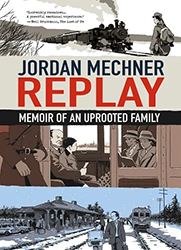It’s fitting that Harvey Pekar’s last two books, both published posthumously, are paeans to the city that he loved. Not one to sugarcoat the truth, Pekar never set out to make Cleveland look better than it is. He never claimed to be anything other than a regular guy trying to make ends meet in a regular town. When the movie version of his comic American Splendor brought him recognition, Pekar was still just a regular guy continuing to do what he always did: write comics about being a regular guy in a regular town. Yet, underneath the hang-dog expression and slumped shoulders, Pekar was an amazingly well-read man with a passion for learning and for sharing his knowledge through the under-appreciated medium of comics.
Both Cleveland and Not the Israel My Parents Promised Me illuminate Pekar’s early years growing up as the son of immigrants in a racially divided city. Both books feature sites that are famous in Pekar-land: favorite bookstores, restaurants, neighborhoods, and libraries. Cleveland intertwines the history of the city with the history of Pekar and his family. It never feels like a history lesson; instead, it’s a conversation between the reader and author. For long-time Pekar fans, there’s not much new here, but that doesn’t matter. Like a favorite flavor ice cream, you can eat it again and again and not get tired of it. Joseph Remnant’s art perfectly captures Pekar’s moods, and his views of the city are strikingly accurate. Each panel is an intricate working of fine lines and details, and each deserves close study and appreciation.
As he does in Cleveland, Pekar retraces the history of the city in Not the Israel My Parents Promised Me, but this time he delves much deeper into questions of religion, spirituality, and the role of Israel in his family’s life. Over the course of a single day, Pekar shows artist JT Waldman around town, all the while regaling him with a comprehensive history of Jews from biblical times to the present. Pekar’s parents were Zionists, and while Pekar respects their love of Israel, his own feelings toward Israel are more complicated. In his usual curmudgeonly conversational style, Pekar displays his vast knowledge of history and culture. After spending a day in his company, readers will hear his voice in their heads long after the last page. Waldman’s art has no equal; as in his stunning Megillat Esther (Jewish Publication Society, 2006), he combines elements of mythology and fantasy, but his portraits of the people in Pekar’s life are alive with spot-on accuracy.
Clevelanders know about loss and heartbreak. Local t‑shirts proclaim: “Cleveland…you’ve got to be tough.” Our sports teams don’t win championships. The sun doesn’t shine for months on end. When Harvey Pekar died in the summer of 2010, Clevelanders lost a champion. Yes, Harvey Pekar loved Cleveland…and Cleveland loved him back.
Wendy Wasman, Clevelander

Nonfiction
Harvey Pekar’s Cleveland
- Review
By
– July 10, 2012
Wendy Wasman is the librarian & archivist at the Cleveland Museum of Natural History in Cleveland, Ohio.
Discussion Questions

Jewish literature inspires, enriches, and educates the community.
Help support the Jewish Book Council.



